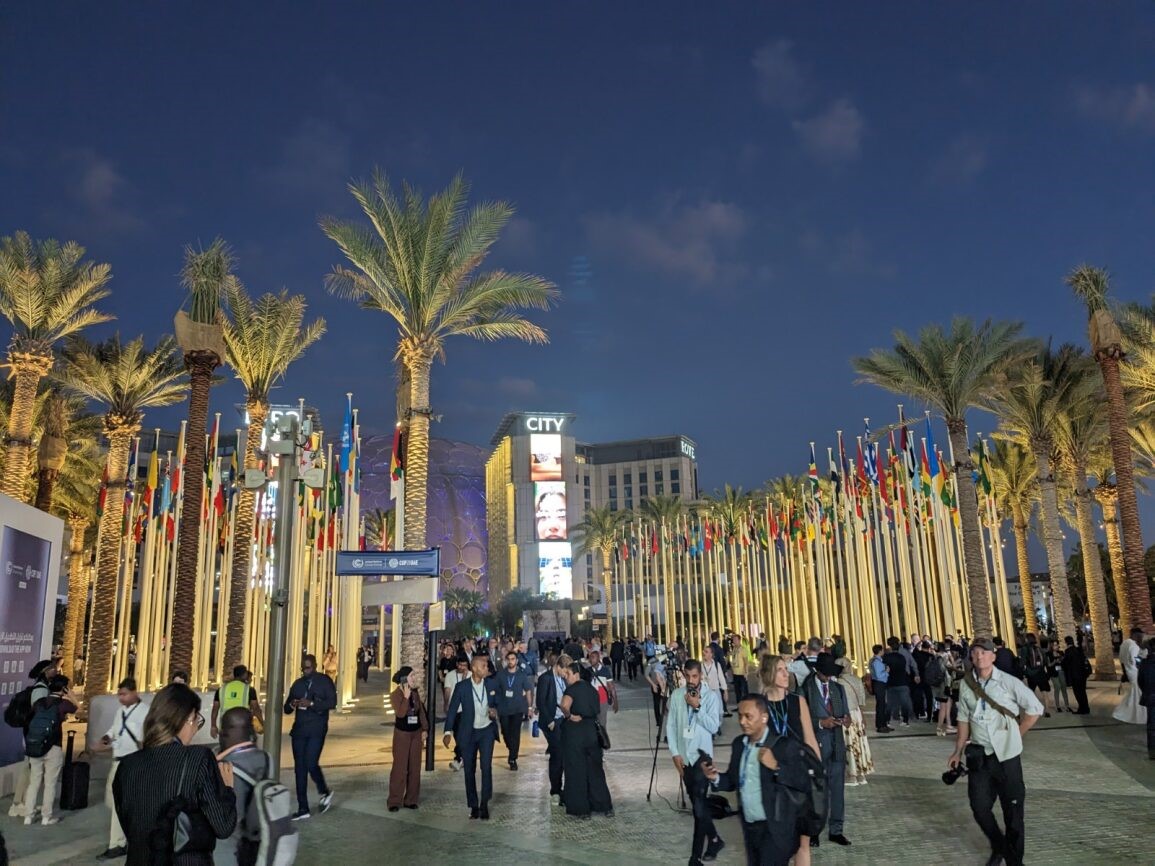Phipps Stories
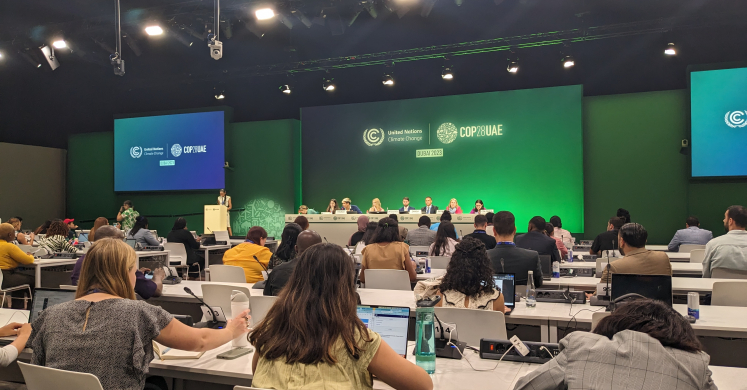
A Glimpse Inside the ACE Negotiations at COP28
The news often covers the outcomes of the negotiations at COP, celebrating advancements and criticizing vague language, but what actually happens inside the negotiating rooms? Anna and Jennifer are excited to share their insights.
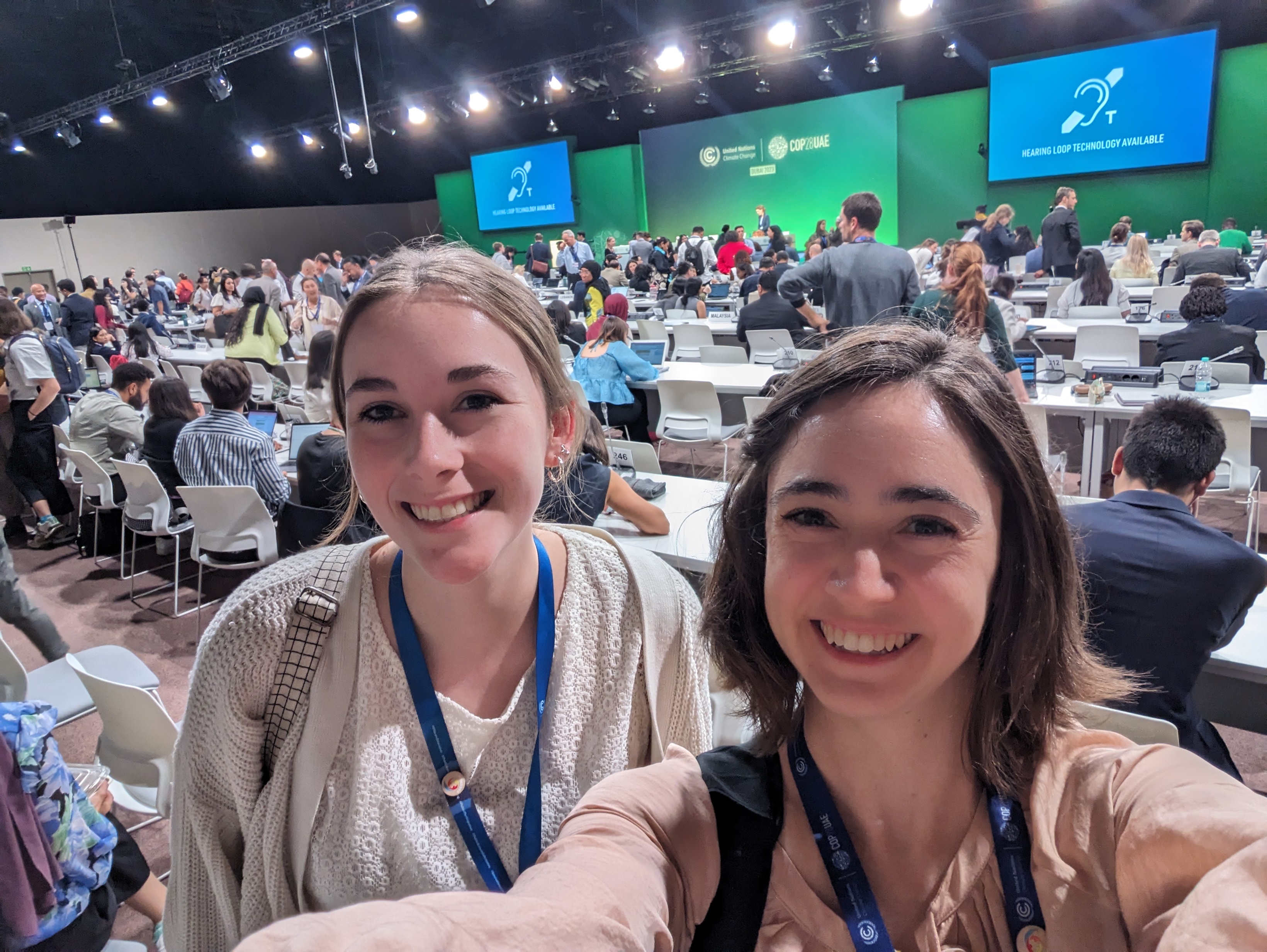
Anna and Jennifer in the Global StockTake Negotiations
Coming into COP, we had very limited knowledge on the negotiation processes. There are several different types of negotiations that happen: the main ones being plenary, informal consultation, and contact groups which are open to observers to watch unless stated otherwise. Other negotiations such as “informal-informals” are often closed to observers. The role of these meetings is to work on drafting text, resolving disputes or advancing contentious negotiations. As Anna stated during COP28, “You can’t inf-inf your way out of every problem, but you can certainly try!” This became a running joke as many of the contentious negotiations we followed moved into informal-informals after nearly every session.
The negotiations were long and grueling, often running twice or even three times as long as they are scheduled. Primarily, we followed the negotiations on the Global Stocktake and Action for Climate Empowerment (ACE). Although we did sit in on the initial brief round of negotiations on National Adaption Plans where nations decided if they should use their entire previous draft text or start with the main highlights and make a new text from there. It was interesting to see that even the procedure for the negotiations is up for negotiation!
One of the challenges as an observer is that many of the popular negotiations have a limited number of chairs available, and standing is not allowed. Parties also have first right to the chairs in the room, which means that sometimes observers cannot get into the room. This year, however, COP28 implemented a new ticketing system to ensure that at least one representative from each observer constituencies was present. This is important because a representative from each of the nine observer constituencies may be given the chance to give a brief intervention speech at the end if there is time. The new ticketing system allowed for observer representation even if the rooms were full. Luckily, the negotiations we attended had enough seats for observers! In our first day of negotiations, no one formed lines – everyone crowded around the doorways and tried to shove their way into the negotiating rooms because they were so frantic to get a seat. We started arriving more than 30 minutes early to the negotiations and worked with others to form lines for both Party and observers. This relieved a lot of tension for everyone!
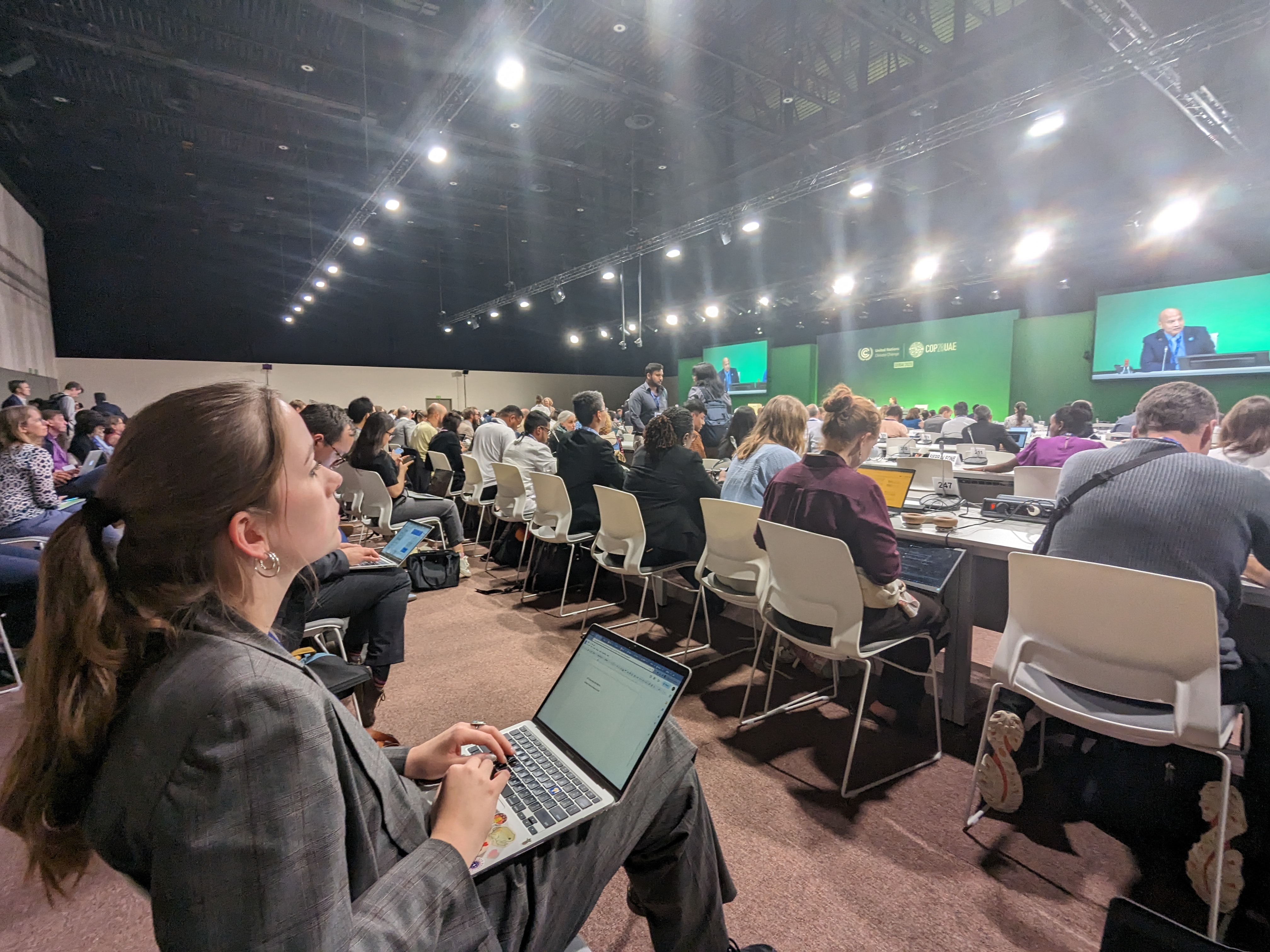
Getting into the rooms was only the start of the chaos. In the Matters Relating to Action for Climate Empowerment (ACE) negotiations we attended, the usually collaborative group of negotiators found themselves in a deadlocked argument over whether to include finance for ACE in the draft text. ACE focuses on climate education, public awareness and participation, public access to information, training, and international cooperation. Solving the climate crisis becomes very difficult if the average person cannot access accurate and science-backed climate information and have ways to act in their own lives. We need everyone on board to make a real change. Without problem-solving ways to finance ACE initiatives, many nations will continue to lack in these invaluable areas.
As we quickly learned, you truly have no idea how much time and energy goes into the wording of these climate policies until you’re in the negotiating rooms! Countries debate the smallest details: Should we ‘ensure’ that these specific topics are part of future dialogues, or should we ‘consider’ them for future topics? The time spent on wording is for good reason; we need phrasing that will actually hold countries accountable and uphold a clear standard. For example, the G77 - a group of 135 developing countries - emphasized the need to include finance for ACE in the draft text, while the EU argued that “tools and support” should cover it well enough. The EU wanted to keep specific finance language out of the text, but the G77 insisted that it needed to be directly named or it may not ever be addressed in future dialogues.
So where did we fit into all these negotiations as observers? As part of YOUNGO (the United Nations’ official children and youth constituency)’s ACE working group, we were in full support of the G77’s proposed text – in fact, we helped write it! We drafted a paragraph regarding finance for ACE and its inclusion in the ACE dialogues, then proposed it to negotiators from the G77 before the second round of negotiations. They agreed with much of what we wrote and made their own edits before bringing it to the table. Seeing the text we had worked on used by negotiators in the discussions was definitely an empowering moment! This was a great way to have influence as an observer. Saying that negotiators have a lot to do is a massive understatement, and they often welcome observer constituencies to propose language so they don’t have to write it themselves! If your observer constituency wants a specific issue to be covered in the text, it becomes significantly more likely that it will be included if you propose a paragraph and give it directly to a Party who aligns with that issue. This gives negotiators a great base to edit, and you get to see your demands included with the rest!
When the G77 representative shared the draft text in the negotiations, disagreements broke out. The version they shared was merged with an existing paragraph of the draft text instead of presented as its own new, more thorough paragraph. This was not what the rest of the G77 had agreed upon. Arguments broke out both among the G77 and in the broader negotiations as nations didn’t understand why the existing paragraph was being changed so dramatically. The session ended with the Co-Facilitators (two representatives from the Global North and Global South) scheduling an informal-informal to work through all the chaos that this had caused. Thank goodness for those inf-infs to help clear up misunderstandings! The G77 representative agreed to bring our original paragraph with the G77’s edits to the informal-informal and see if that would have any luck.
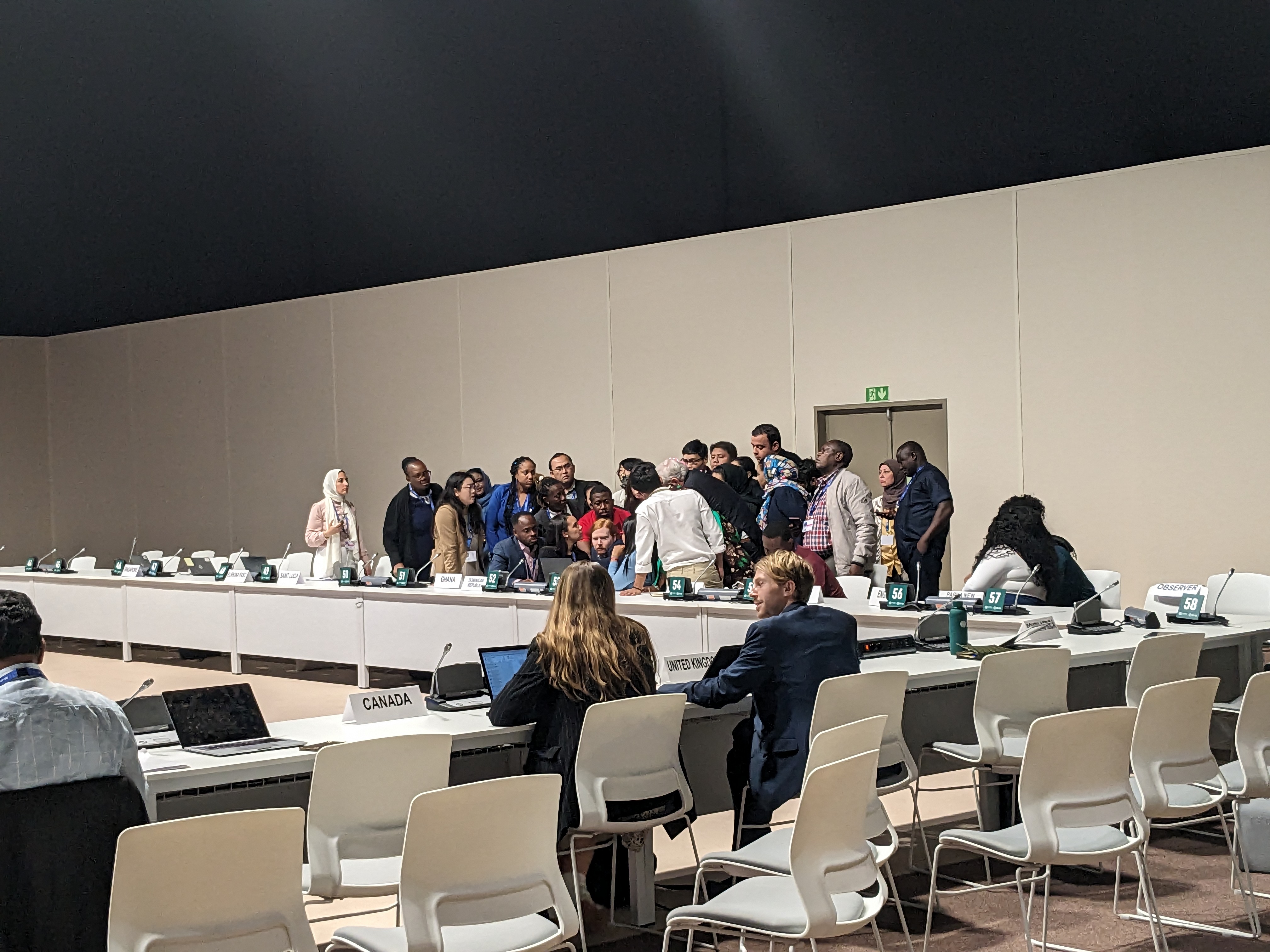
The G77 in a huddle during tense ACE negotiations
The next session, there was a deadlock almost immediately. The EU had a text they liked and the G77 had a text they liked, and many nations chose sides. Neither side was very willing to cooperate. That day, we had to move to three different rooms to continue the negotiations when they ran overtime! In between rooms, Anna approached the negotiators from the United States in the hallway and urged them to work with the G77’s text. We also saw a few negotiators from the G77 talking with the United States before the session restarted. We were nervous to speak to the negotiators directly, but we were very glad Anna did! When the session began, the United States did break the deadlock by proposing edits to the G77’s text, which encouraged other nations to do the same! Even the EU begrudgingly worked on the G77’s text, though with notably large revisions.
We stayed for all the ACE negotiations that day despite how long they ran over. As part of an observer constituency, there was a chance we could give an intervention in the ACE negotiations. Along with other ACE working group members, we drafted an intervention speech on behalf of YOUNGO. This speech outlined the need for finances dedicated to ACE to solve the chronic finance gap currently hindering progress on ACE initiatives. Anna and another youth observer from the Global South were chosen to give the intervention. As Parties negotiated and the likely outcomes kept changing, we continued to update several versions of the interventions accordingly so we would be prepared. We also spent a lot of time transcribing what different nations were saying and messaging with more experienced observers in our group chat to learn more about the process.
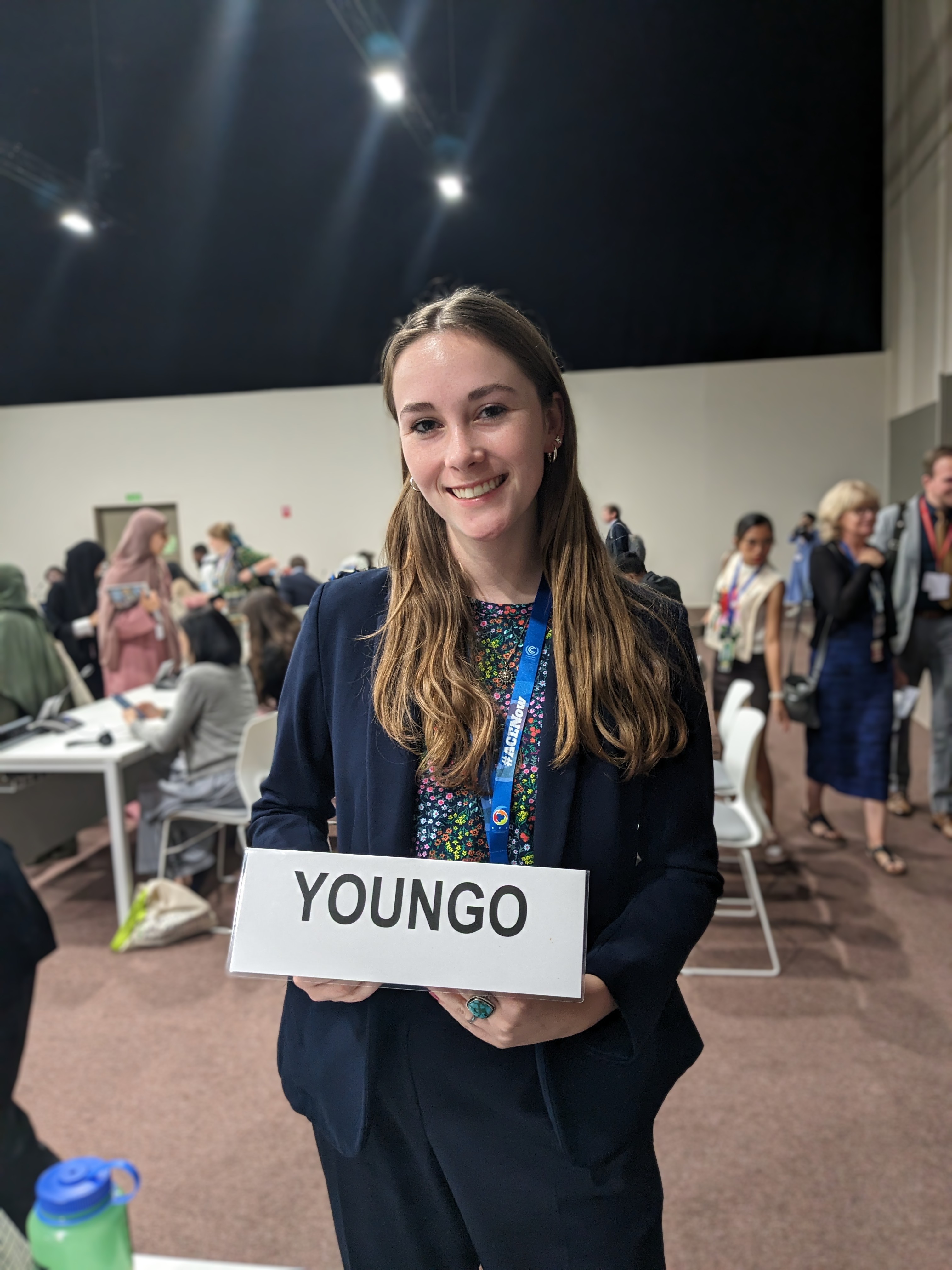
Anna representing YOUNGO in the ACE negotiations
Because it’s a Party-driven process, observers are given the last opportunity to speak if there is time. Unfortunately, every session of the ACE negotiations ran so far over time that no observer constituencies were able to give our interventions. Sadly, Parties were still unable to compromise on a text to appease everyone, and for the first time in history, there was no conclusion on a text from ACE. The EU in particular was unwilling to compromise and kept saying, “we’ve already shown the maximum amount of flexibility,” while refusing to accept text that ensured discussions regarding finance for ACE in the future ACE dialogues. Unable to reach an agreement on the text, the G77 invoked Rule 16, which states: “Any item of the agenda of an ordinary session, consideration of which has not been completed at the session, shall be included automatically in the agenda of the next ordinary session, unless otherwise decided by the Conference of the Parties.” The G77 stated that a text without finance for ACE was nothing of substance and they could not agree to it. Both the contentious section on finance and all the other paragraphs of text that had been previously approved by everyone will need to be completely renegotiated at the Bonn Climate Change Conference in June. While it’s disappointing that no ACE text came out of COP28, invoking Rule 16 was a strategic move. Now there will be more opportunity to thoroughly include finance in the draft text at Bonn instead of tacking it onto an existing document. Afterwards, we thanked a few negotiators for their spirit of compromise and support of ACE finance, and we thanked the G77 negotiators for trying so hard to push these important issues through.
These negotiations showed just how difficult it can be to write texts that represent all the beautifully diverse nations and cultures on our planet. Making guidelines that apply to everyone, but also consider the differing needs, barriers, social and political climates, and feasibility for each nation is extraordinarily tricky. It takes a lot of cooperation as well as deep trust in each other to work on something as big as climate change. Nations need to prove their commitment to 1.5°C and to each other, acknowledge their own responsibility, and work together to make progress. There are many challenges that stand in the way of climate action, but to quote the UNFCCC’s description of ACE, “Success will require broad collaboration between all levels of government and all sectors of society… Everyone, including and perhaps especially the young, must understand and participate in the transition to a low-emission, climate-resilient world.” We did our best to participate in COP28, and you can bet we’ll continue to do everything we can to make an impact!
To read more about our experience at COP28, check out our What We Learned from COP28 blog post.
